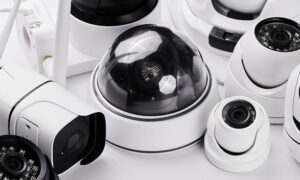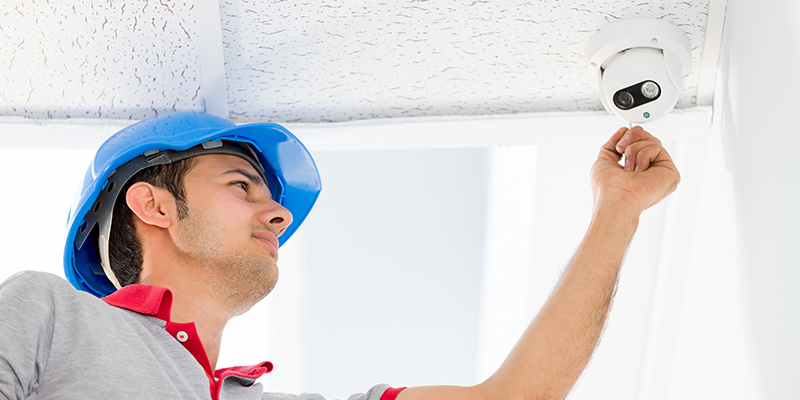Can an HOA restrict security cameras? This is one of the most common questions homeowners ask. Planned communities are known for having stringent rules about what residents can and can’t do. When it comes to security cameras, though, the answer isn’t always straightforward.
Can an HOA Restrict Security Cameras?
Security cameras have become widely accessible over the past few decades. Compared to the ones that came before, security cameras nowadays are smaller, easier to install, and more versatile. Thanks to Internet capabilities, owners can also access footage through smart devices.
Given the advancement of home security tech, it’s no surprise that many homeowners find security cameras an easy investment. After all, security cameras can help deter crime and catch footage of criminal acts. Surveillance cameras have become very useful to homeowners, with porch pirates still a widespread problem in the United States.
However, security cameras aren’t always allowed in community associations. Condominiums and HOAs typically have rules restricting security cameras, even if owners argue that they intend to install them on private property.
Three key considerations when installing security cameras in HOAs are state and local laws, the association’s governing documents, and the reasonable expectation of privacy.
State and Local Laws
Homeowners and HOA boards should first consider state and local laws. The law prohibits associations from banning security cameras in some states and local areas.
One example is Texas. According to Texas Property Code Section 202.023, a property owners’ association may not prevent an owner from installing security measures, including a security camera. However, the provision doesn’t apply to some types of condominiums and property owners’ associations.
In general, though, associations can still regulate the appearance and placement of the cameras. Since this largely depends on the association’s location, it’s best to consult a lawyer to confirm.
Check Governing Documents
The next thing homeowners and HOA boards should consider are the governing documents. More specifically, an association’s CC&Rs should outline the rules concerning security camera installations.
Some associations’ CC&Rs explicitly restrict security cameras, mentioning them by name. However, security cameras more often than not fall under the scope of an association’s architectural guidelines. These guidelines typically prohibit owners from making architectural changes or improvements without the HOA’s approval.
Reasonable Expectation of Privacy
Finally, homeowners and HOA boards should consider the residents’ reasonable expectation of privacy. This means that the HOA nor its residents can position their cameras so that they point to spaces where people expect privacy. Examples include windows into a neighbor’s home and backyards.
 Can HOA Ban Security Cameras?
Can HOA Ban Security Cameras?
Whether or not an HOA can ban security cameras depends on state/local laws and the association’s CC&Rs. As discussed above, state and local laws may prevent an HOA or condominium from prohibiting security cameras altogether. Moreover, the association’s governing documents should indicate its policies for security camera installation. At the very least, the HOA’s architectural standards should cover it.
Can HOA Restrict Security Surveillance in Common Areas?
An HOA can prohibit homeowners from installing security cameras in common areas. Common areas are shared spaces, so no single homeowner or group of homeowners should be able to monitor them through cameras.
While an HOA isn’t typically required to install security cameras in common areas, it may choose to do so. The HOA board must consider some liability involved here, though. The HOA must not place them in private areas, such as shower rooms and bathrooms. Cameras should also never point at places where people have a reasonable expectation of privacy, such as windows and backyards.
HOA Security Camera Policy
If the HOA does install cameras in common areas, it should create a security camera policy that considers the following points:
- The purpose/objective of the cameras
- The scope of the security cameras
- What to do with the footage
- Where to store the footage (never on personal devices)
- The request process if someone needs the footage for evidence
- Who can view the footage (it’s best to limit this to key people only)
- Duration of storage before destroying it
- The placement of the security cameras
- Aesthetics
- A maintenance plan for the cameras, including software updates
Board members should make sure to notify residents of this policy. The policy should also align with federal, state, and local laws on privacy, surveillance cameras, audio recordings, and footage. Lastly, it’s best to post signs indicating a security camera is present in common areas. This way, people know they’re potentially being recorded.
Can an HOA Force You to Remove Security Cameras?
If an owner installs a security camera improperly or without the HOA’s approval, the HOA may ask the owner to take it down. In general, associations can ask owners to reverse or remedy anything that violates community rules. This includes any breach of security camera policies or architectural guidelines.
Again, security cameras may fall under an association’s architectural rules. If an owner makes an architectural change without getting the HOA’s approval, the board may force the owner to undo the change. In this case, it means removing the security camera at the owner’s expense. The owner may even need to remove the camera and apply for architectural approval before reinstalling it.
Therefore, if homeowners don’t want to waste time and money undoing unauthorized changes, they should follow the association’s requirements and procedures. In doing so, owners can even avoid potentially incurring violation fines.
Allowing Owner-Installed Security Cameras
 An HOA or condo association can permit the installation of security cameras on private property. However, to ensure uniformity and maintain property values within the community, an association should regulate two things: appearance and placement.
An HOA or condo association can permit the installation of security cameras on private property. However, to ensure uniformity and maintain property values within the community, an association should regulate two things: appearance and placement.
- Appearance. The design of owner-installed security cameras should stick to the community’s aesthetic. Nothing that stands out too much or doesn’t align with the rest of the neighborhood’s appearance. Fortunately, security cameras come in all shapes and forms nowadays. As such, owners shouldn’t have a hard time fulfilling this requirement.
- Placement. In addition to upholding neighbors’ reasonable expectation of privacy, an HOA may also wish to regulate the exact placement of the security camera. This helps make sure that cameras aren’t too obtrusive.
Can an HOA Restrict Security Cameras? Answered!
Security cameras offer many benefits, but they don’t always go hand in hand with homeownership in HOA communities. Residents should understand that HOAs and condos have rules that can impede their ability to decorate or change their homes as they please, including the installation of security cameras. However, such rules exist to enhance curb appeal and protect property values.
Is your association having trouble keeping up with architectural requests and violations? Condo Manager is the solution. Call us today at 800-626-1267 or contact us online for a free demo!
RELATED ARTICLES:
- A Guide For Homeowners Who Want Architectural Changes In HOA Homes
- There’s More To Putting Up HOA Fences That Homeowners Know
- 9 Advantages Of Hiring HOA Security



